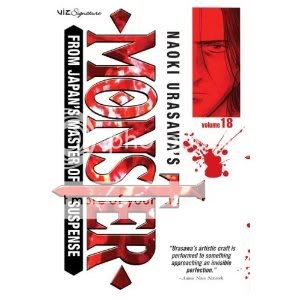
Naoki Urasawa’s Monster Vols. 6-18
Naoki Urasawa, writer-artist
Viz, 2006-2008
200+ pages each
$9.99 each
It’s not quite accurate to say that Monster got away from Naoki Urasawa in the end. Never–not as volume after volume of increasingly baroque hidden connections, repressed memories, and buried Communist conspiracies multiplied and refracted like a screensaver, not even as he added still more characters to a cast that already made The Lord of the Rings look like No Exit in Volume frickin’ 18–did Urasawa come across as anything but totally in control. Each time a new concept was introduced, I knew it would tie into someone or something we’d already met in a way that would nonetheless surprise and delight me. Each time a new character came along, I knew I’d be made to care about this new sad-sack with either a tormented past or an overdeveloped sense of right and wrong. Every twist made it clear I was in the hands of a master.
Yet for all that I knew Urasawa was making conscious decisions at every turn rather than running around frantically to keep all the plates spinning, I can’t help but feel that by the end, he’d made some bad decisions, spun some broken plates. First and foremost, remember when Dr. Tenma was the main character? Nominally I suppose that’s still true, as the final showdown with the titular character is with him. But by then you’re just as likely to be spending screentime with Grimmer, or Nina, or Eva, or Reichwein, or Lunge, or Gillen, or Verdeman, or even random characters who are in and out in the space of one volume like Martin or Milan or the people of Ruhenheim. (That I remember the vast majority of those names off the top of my head speaks well of the material, but still.) Without the singular, driving focus of the original concept– A doctor saves a little boy who grows up to be a serial killer and now must hunt him down–the story’s sprawl starts to pull it apart a bit, and the climactic confrontation is robbed of some of its weight.
Then there’s that confrontation itself. It’s distinguished by the strongest image in the series, a searing two-page spread that screams “instant classic.” And it undoubtedly brings to bear the full weight of the preceding 17 1/2 volumes of cat-and-mouse, before knowingly (if a wee bit over-familiarly) pulling the rug out from under the moment. The problem is that for, oh, four or five volumes leading up to that moment, it’s felt like one climax after another. I know this could be an artifact of the translation and adaptation process, but the dialogue really starts to feel artificially stretched out in the home stretch, with short sentences split between five panels across a full page in some cases just for dramatic impact. Of course, do that too often and the impact is dulled; do it for a quarter of your series and it starts to feel like a neurotic tic. Particularly given how many times this is done to depict a character reaching into the recesses of his or her memory and pulling out something dark and terrible but stopping just short of dragging it into the light for good, the repetition begins to grate, and to make it difficult to distinguish final revelations from teases.
That said, this stuff is as thick and engrossing as quicksand. The steady rhythm and rock-solid character designs are pretty much tailor-made for getting lodged in your head and replayed as you drift off to sleep at night–I for one had a pretty messed-up dream last night about my wife and I fleeing through a hospital from a monstrous child-thing. Several sequences are genuinely chilling: The standouts for me are the cruelty of a child who briefly fell under the tutelage of the title character, the dark storybooks of Klaus Poppe (beautifully drawn in a vastly different style; remember that storybook about the train in the Dark Tower series?), and the ending itself. I’m not sure how sold I am on the book’s constant waxing philosophical about good, evil, and the value of human life, particularly the hard line it makes Tenma take against killing even in immediate self-defense or the defense of others, given the track records of the characters he tends to be pointing his gun at in these situations. But at the same time, the material concerning the abuse of children, the mad ambitions of people with lots of power and little oversight, and the notion that secret, forgotten deeds committed in the name of defunct ideologies can reverberate indefinitely with disastrous consequences is all very effective. That last bit, it strikes me now, is symbolized by the sign of the long-gone Three Frogs pub that becomes so pivotal: An artifact that has outlived its artisans, a symbol that has outlived what it symbolized, yet which still has a potent ability to harm. From the high concept on down, Monster is a story of unforeseen consequences, which are often more awful than the awful things we meant to happen.
Tags: comics, comics reviews, Comics Time, reviews

2 Responses to Comics Time: Naoki Urasawa’s Monster Vols. 6-18